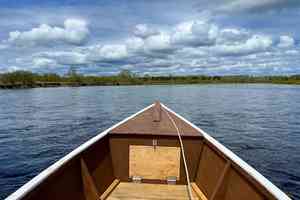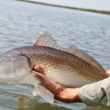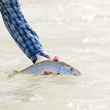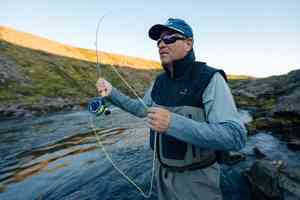In close to 40 years of writing about dogs and the people who own, breed, train, campaign, hunt with, live with, and otherwise fool with them, I’m not sure I’ve encountered anyone as obsessively passionate about what they do as Meagan Cook. If her professional identity is as the Fishing Manager for Orvis Austin in Texas, at certain wingshooting lodges around the country the über-energetic 27-year-old Austin native is known as “The Girl Who Moves Dogs.”
Cook, you see, is the founder of Field to Family Dogs, an organization whose mission is to “re-home” dogs that, for whatever reasons, aren’t contributing to the bottom line at the commercial hunting operations where they’re currently kennelled. Think of it as gundog rescue on a national scale. Some of these dogs had to be retired due to age, illness, or injury; some are washouts who simply failed to make the cut. Either way they’re financial liabilities, and the harsh reality is that once a dog from the “industry” falls into this column on the balance sheet, he’s likely to be removed from the books.
I don’t think I need to spell it out any more graphically than that.
For Meagan Cook, this status quo was unacceptable. Her eyes were opened following a visit to a certain wingshooting lodge in 2018—a visit that, not coincidentally, resulted in her bringing home a young English cocker spaniel that had washed out of the lodge’s training program. Cook hadn’t gone there looking for a dog; the dog just sort of happened to her.
I caught up with Meagan while she was driving through the Texas Hill Country, enroute to a property to check out some candidates—canine, I mean—for the Field to Family program.
More Like This
The thing was, she explained, she had decided that she was going to get a cocker. In fact, she was about to send a puppy deposit to a well-known breeder. But when she found herself at that particular lodge, and found out that they had cockers, and made it known that she was thinking of getting a cocker herself, not so much as a hunter but as an athletic, high-energy companion for various outdoor adventures ...
“One of the guides said, ‘If you want a cocker, why don’t you take Misty?,” she recalled. “I said, ‘Are you serious?’ And he said, ‘Yeah.’
“So I took her, and re-named her Birdie. What I didn’t know at the time—and no one else did either, apparently!—was that she was pregnant and about halfway to term. She whelped five purebred pups, and I ‘accidentally’ kept two. One of them’s next to me on the seat of the car right now.”
Meagan’s delight at the arrival of Birdie and her pups was tempered, however, by the sobering realization that if she (Meagan) hadn’t come along when she did, Birdie—who had plenty to offer to an owner like Meagan irrespective of her abilities in the field—undoubtedly would have been put down.
“That whole experience really inspired the Field to Family story,” she recalled. “I just thought, ‘There’s a need here; why is nobody doing anything about it; what can I do?’ Then, in the summer of 2019, I was at an Orvis event in Vermont, and one night at dinner I was sitting next to Reid Bryant (Orvis’s Wingshooting Services Manager) and I just unloaded on him. All these thoughts that had consumed my life for the previous nine months came pouring out.
“When I got back from Vermont, I decided I’m going to do this. I’m going to reach out to these lodges and see which dogs need to be re-homed. I don’t know where it’s going to go or what it’s going to turn into, but I’m going to do it.”
The first dog in the program was a five-year-old German shorthaired pointer, “Lobo,” that was permanently lame in one hind leg as a result of snakebite. “Texas Parks and Wildlife put his picture on their Facebook page,” Meagan told me, “and I got 36 applications for his adoption. He went to an amazing home, and for me that was ‘proof of concept.’ It made me realize Wow, this is something that people can get behind. This is something that the the lodges need, the dogs need, and the people who want them need.
“Since then, it’s been the craziest thing. I’ve moved dogs all over the country. There are dogs from Mississippi now living in L.A., dogs from Georgia in Texas. Wednesday I have a GSP (German shorthaired pointer) going to Sun Valley, Idaho. Do you know Andrew Lee, the dog artist? He’s adopted two cockers from us.”
Meagan reckons she’s re-homed somewhere north of 50 dogs at this point, mostly cockers, GSPs, pointers, and English setters—the usual mix found at commercial lodges. Not surprisingly, she works primarily (although not exclusively) through the network of Orvis-endorsed properties. Developing relationships with these operations has been a huge part of Field to Family’s success.
“There was some hesitancy at first,” she said. “I had to make them understand that I’m here to help them. Now they pick up the phone and call me. And I know that I can trust what they’re telling me about the dogs.”
The standard Field to Family adoption fee is $400, which covers (barely) the veterinary and operational costs incurred as a normal part of the process.
Because the organization doesn’t currently have its own facility, dogs that are in transit to their new situations are frequently fostered for some period of time in the homes of friends and other “cooperators.” Field to Family was recently granted 501(c)3 non-profit status by the IRS—meaning that contributions are fully tax-deductible—and with that hurdle surmounted Meagan’s gearing up for some serious fund-raising.
“We’re getting so big,” she said. “We could really use the help.”
No kidding. This is where I need to tell you that in addition to her position at Orvis Austin and her Field to Family duties—an unpaid labor of love that’s terrifically time-consuming—she’s also a full-time student. Yeah, Wow is right.
To learn how you can help, or apply to adopt a dog, visit fieldtofamilydogs.org. You can also find them on Facebook and Instagram.
![Meagan Cook with CeCe [left] and her mother Birdie [right], the dog that started it all (Images courtesy: Meagan Cook). meagan cook dog rescue](https://www.hatchmag.com/sites/default/files/styles/preload/public/field/image/meagancook.jpg?itok=zlnoDgOt×tamp=1645566375)
































Comments